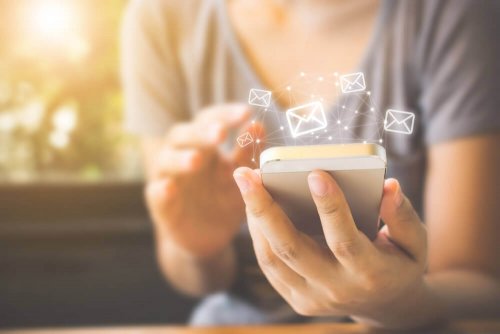10 Keys to Disconnecting from Your Cell Phone


Written and verified by the philosopher Isbelia Esther Farías López
These 10 keys to disconnecting from your cell phone will be very useful if you plan to go on vacation or simply feel that you can’t handle any more stress. It’s no coincidence that many people have decided to begin a “cell phone detox”, at least for a couple of hours, to better care for their mental and emotional health.
The truth is that cell phones can be so demanding that they can keep people from enjoying a few minutes of tranquility, as they get many social media notifications or work emails. In this regard, although your workday may have ended, you continue to get mobile alerts that keep you from enjoying your leisure time with others.
Based on this, studies have emphasized that the use of cell phones, along with many other technological devices, ends up becoming an obsessive routine that includes a compulsive ritual of checking them every minute. In this article, discover what you can do to counter this.
Why you should disconnect from your cell phone
The vast amount of information that technology provides imposes new challenges regarding its use to ensure that it doesn’t involve a health risk. The new behaviors that arise with the use of technology aren’t always healthy.
Research supports this. After all, as technologies are improved, new terms appear. For example, there’s nomophobia, the irrational fear of leaving home without a cell phone, which causes anxiety in those who suffer from it. Also, there’s a constant need for wanting to know what your contacts are doing, which is known as FOMO or “fear of missing out”.
Therefore, despite all the advantages of technological devices, it’s often necessary to learn to disconnect. Below, we share 10 keys to disconnecting from your cell phone that will help you lead a stress-free life.
10 keys to disconnecting from your cell phone

1. Only keep the most useful apps.
This includes the calendar, for example. Then, eliminate those that only drain both you and your cell phone’s battery due to their numerous notifications. To select which applications to leave or delete, think about how much you use each of them.
2. Share the challenge with someone else.
This can be your partner, a friend or family member. If someone close to you is trying to disconnect as well, you may feel more motivated. This way, instead of paying attention to your cell phone, you can plan outings together or enjoy recreational activities.
A really helpful idea is to apply the rule that, when you’re spending time together outside your home, you must keep your cell phones on silent. This way, you can enjoy pleasant moments while you strengthen your relationship at the same time.
Paying attention to your notifications all the time is a form of worrying that can cause you miss out on the interesting things that happen in your everyday life.
3. Avoid synchronizing your accounts.
Instead, establish a schedule. If you sync your work email accounts, it’ll be harder for you to disconnect, as a customer will always need you or you’ll need to fix a problem at any minute. Use a schedule to organize yourself and leave all your work behind when you leave the office. This will also allow you to enjoy more hours of rest.
You may want to read: 9 Healthy Habits that Can Lead to a Long Life
4. Set your cell phone aside.

It doesn’t need to be on the table while you’re having dinner. Also, you don’t need to take it everywhere while you’re at home. Set it aside and enjoy your food, read, drink a cup of tea, and devote some time to yourself. Keep in mind that, if something urgent arises, you’re going to know it anyway because we’re never completely cut off in this world.
5. Set a designated time to use your cell phone.
Obviously, you always have something pending to resolve or do. However, try to only use your cell phone for some time and then set it aside. Thus, just like you know that you have to rest for several hours, you can also devote a specific time to use your cell phone and then do other activities.
6. Set your cell phone to silent mode.
If your phone doesn’t vibrate or beep, you can distract yourself with other activities and be fully present. Your mind will be concentrated there, without thinking of anything else. Thus, you should opt for this option frequently, especially at bedtime.
7. Use a traditional watch.
Avoid using your cell phone as an alarm clock. This will allow you to wake up and spend a few minutes in bed completely relaxed, without feeling the burden of all your pending notifications.
8. Do something different.
Learn a new language, try writing a book, paint, or dedicate yourself to the things you’ve always dreamed of. To achieve this, you must disconnect from your cell phone for a while. Some people spend hours sharing jokes or news when they could be using that time on other things they’re passionate about.
9. Put your cell phone on airplane mode.

This is a good choice while you’re playing sports or dedicating yourself to something else. When you’re done, you can turn off the airplane mode and check everything.
10. Turn it off.
If, despite everything, you have a hard time disconnecting from your cell phone, simply turn it off and reflect on the use you give the device.
Conclusion
If after implementing these 10 keys to disconnecting from your cell phone, you feel you can’t do it, then perhaps it’s time to ask a psychologist for help. This is because you may be suffering from an addiction.
The most important thing is to stay calm. In the beginning, perhaps you’ll have a hard time disconnecting from your cell phone. However, you’ll gradually realize that you can live without it. Practice mindfulness or yoga to attract stillness to your life. Remember that the most important thing is to be at peace with yourself.
Finally, if you think you may need some extra help and support, don’t hesitate to get some from a trained therapist.
All cited sources were thoroughly reviewed by our team to ensure their quality, reliability, currency, and validity. The bibliography of this article was considered reliable and of academic or scientific accuracy.
- Carbonell, X., Fúster, H., Chamarro, A., & Oberst, U. (2012). Adicción a internet y móvil: Una revisión de estudios empíricos Españoles. Papeles Del Psicologo.
- Chóliz Montañés, M., & Villanueva Silvestre, V. (2011). Evaluación de la adicción al móvil en la adolescencia. Chóliz Montañés, Mariano ; Villanueva Silvestre, Verónica. Evaluación de La Adicción Al Móvil En La Adolescencia. En: Revista Española de Drogodependencias, 2011, Vol. 36, No. 2: 165.
- PEDRERO PÉREZ, E. J., RODRÍGUEZ MONJE, M. T., & RUIZ SÁNCHEZ DE LEÓN, J. M. (2012). Adicción o abuso del teléfono móvil . Revisión de la literatura . Mobile phone abuse or addiction . A review of the literature . Adicciones.
- Sánchez-Carbonell, X., Beranuy, M., Castellana, M., Chamarro, A., & Oberst, U. (2008). La adicción a Internet y al móvil: ¿moda o trastorno? Adicciones. https://doi.org/10.20882/adicciones.279
- Sanchez-Carbonell, Xavier;Beranuy, Marta; Castellana, MOntserrat; Chamarro, Ander; Oberst, U. (2008). La Adiccion a Internet y al móvil. Adicciones.
This text is provided for informational purposes only and does not replace consultation with a professional. If in doubt, consult your specialist.








